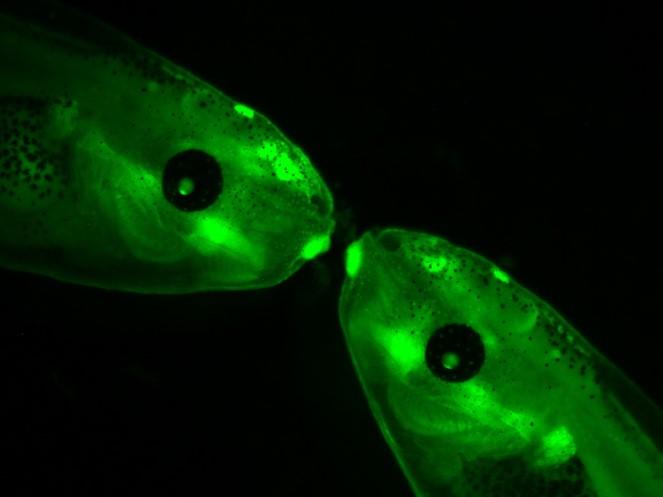
Credit: Matt Guille
People with genetic diseases might be closer to learning what has caused their disease and to improved care, thanks to a £992,000 grant to the Universities of Portsmouth and Southampton in the UK.
Frog geneticists, medical genomic research scientists and clinical geneticists are working together to see if tadpoles can be used to discover which change to a person’s DNA has caused their rare genetic disease.
If successful, this precision medicine study will help clinicians come up with targeted interventions to help patients and their families.
The research team includes geneticists Matt Guille and Colin Sharpe at the University of Portsmouth together with computational genome scientist Sarah Ennis and Professor of Genomic Medicine and clinical geneticist Diana Baralle at the University of Southampton.
Funding was awarded by the Medical Research Council and work is beginning in the new year.
One in 17 people will suffer from a rare disease at some time in their lives. Most of these rare diseases have a genetic cause and often affect children, but proving which gene change causes a disease is a huge challenge.
Professor Ennis said: “Sequencing the genome of affected patients and their family members, and then using bioinformatic tools to identify, compare and contextualise observed genetic variation means we are increasingly able to identify what might be the underlying cause of disease. But with over three billion possible points of variation across the human genome, it is essential have good models to test and prove that what we find, truly is the cause. This evidence must be strong before any changes to clinical management can be considered.”
Professor Guille, who leads a laboratory in the Epigenetics and Developmental Biology research group at Portsmouth, said: “In our initial experiments to test the link between a genetic variation and a disease we found to our surprise that by altering the DNA of tadpoles, four times out of five we could re-create the disease-related changes seen in human patients. We now need to extend and improve our technology to make it applicable to the wider range of disease-related DNA changes provided to us by our clinical collaborators. This will allow us to support our colleagues in providing the more timely, accurate diagnosis that patients and their families so desperately need.
“If the clinical researchers find the information sufficiently useful, then we will continue to work together to scale up the pipeline of gene function analysis in the frog so it can be used to direct effective interventions for a significant number of patients.”
Quite how useful frogs have been as models for human biology often surprises people, Professor Guille said, but much of what we know about how embryos develop and the biology that underpins our understanding of disease was often first discovered in the frog. Almost 80 per cent of the genes known to be altered in human disease are found in the frog, and most genes are found in the same order on the chromosomes of frogs and humans. The advent of gene editing, the technique which won the Nobel prize for Chemistry this year, has transformed our ability to study human genetic diseases in frogs.
Professor Guille said: “Gene editing has arrived at the same time as our ability to sequence DNA at high throughput, which has completely transformed our ability to identify the genes likely to be involved in causing a disease – bringing together these two methods will be a key component of personalised medicine in the future.”
Professor Baralle said: “In the clinic we undertake DNA sequencing to try and find the cause for people’s signs and symptoms. Approximately half the time, we cannot tell if a DNA change found in the sequence is the cause or not, and miss an opportunity for precise management or treatment. This work will make a huge difference to families and their doctors.”
Once one of these variants has been identified as causing the disease, this knowledge guides the clinical interventions for the child and advice to the family on the health of the family’s other existing or future children, and opens the door to screening and prenatal diagnosis.
Professor Guille said previously, studies connecting a gene and a disease were only possible in mice, experiments that are both ethically and financially expensive. Several labs, including his own at the University of Portsmouth, have recently shown that experiments in tadpoles can also provide very strong evidence about the function of variant human genes. The process of re-creating some gene variants in tadpoles is straightforward and can be done in as little as three days.
The project will identify patient variants from clinical research studies overseen by Professors Ennis and Baralle that are already underway as well as through Professor Baralle’s clinics and research work conducted within Genomics England – a government-funded genomics research programme aiming to bring the benefits of genomics sequencing to patients across England. The Wessex Genome Medicine Centre facilitated many patients with rare diseases from across the region to participate in this ambitious effort. The work funded by this grant is an important step in realising the value of a causal genetic diagnosis.
###
Two photos of tadpoles attached. CREDIT Matt Guille
Media Contact
Kate Daniell
[email protected]
https://scienmag.com/1m-step-closer-to-understanding-genetic-diseases/




